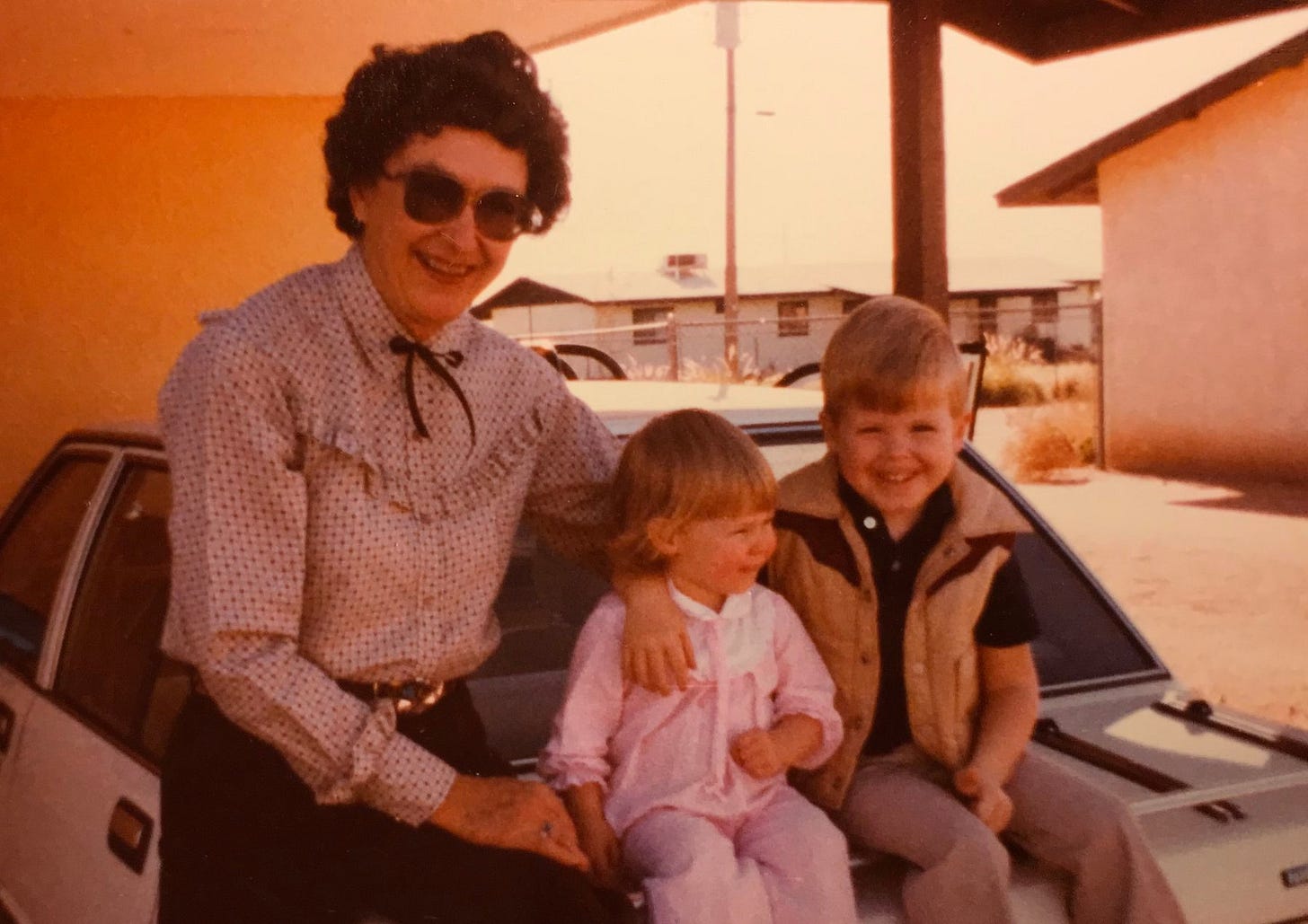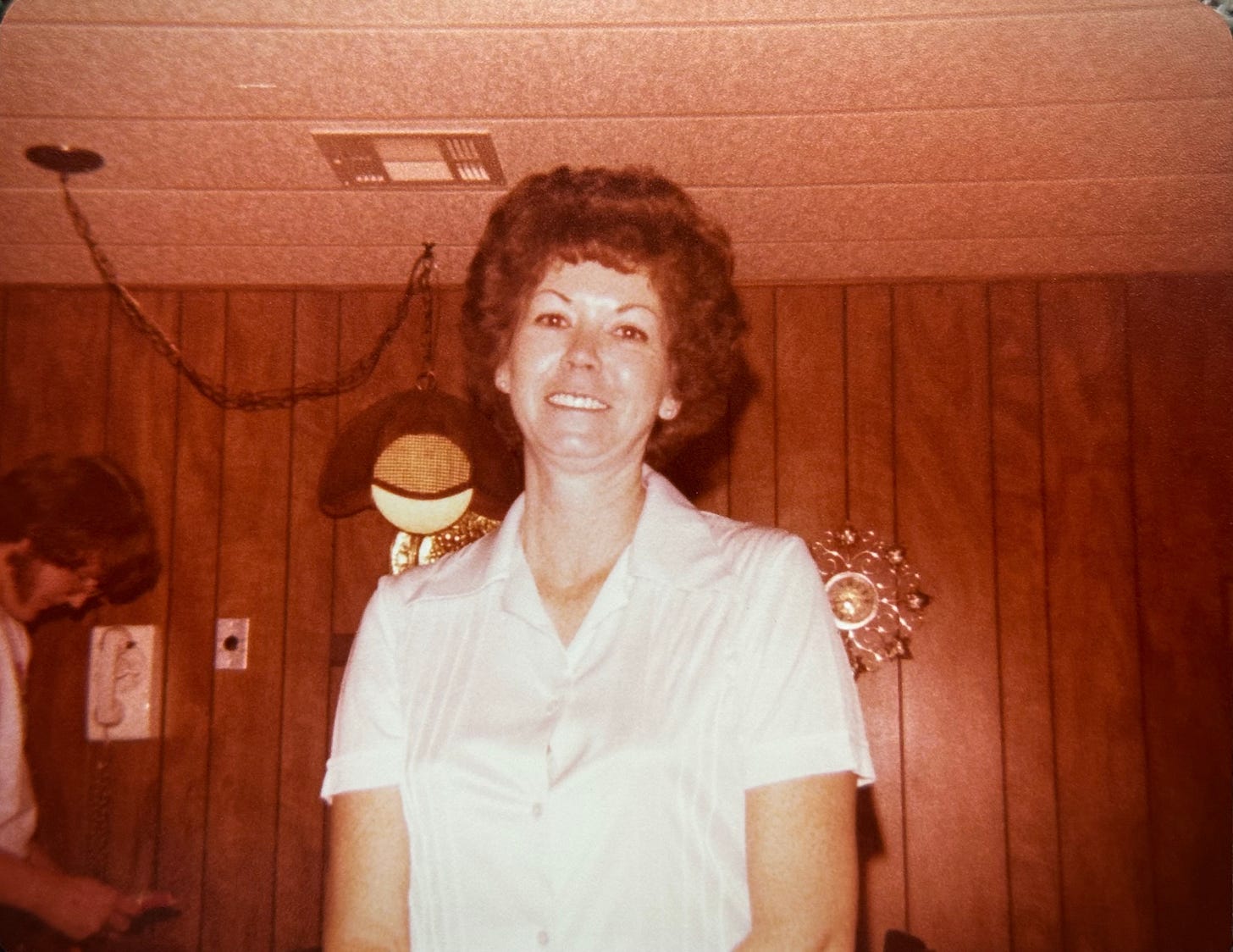Shirley's Letter
Consolation and prophecy endure in this family relic from 1983
By T. Bloom
For the reader’s comfort, what follows probably should’ve been veiled in fiction. However, this letter from Shirley (my paternal grandmother) to my parents upon the death of Mina (my maternal grandmother) seems worthy of being presented in its raw entirety, with as little commentary as possible.
In fact, if you’d like to read it without knowing any more than this, go ahead and scroll down now. And then you can skip the rest, if you’d like.
The bare bones of the story is that Mina passed away suddenly in 1983 following an aneurysm. I remember that day, and sometimes still dream about it; she happened to be babysitting my cousin and me when it occurred.
Shirley and my grandfather, Clarence, were ranchers living in Montana; they’d been friendly with Mina and my other grandfather, Tom, ever since my parents’ wedding in Arizona.
So my mom and dad were young when this death occurred. I’ve tried to imagine each of them — in their early twenties, already parents of two kids, a third on the way, suddenly bereft — reading this letter, absorbing its series of barely-pulled punches. Shirley’s prose is jarring, breathless but economical. She seems torn between two objectives: to offer as much comfort as possible, and to help everyone stare the grim facts of reality straight in the face.
(Members of our family tend to lead with the latter, perhaps believing it to be a more useful and durable form of consolation in the darkest times, though I have myself rarely found it to be so.)
You should probably know that in addition to running the family business, Shirley was a master equestrian, a prolific quilter, and had raised five kids of her own. She’d always been an avid reader and writer, and was a columnist for her local newspaper. Relatively confined to a postage-stamp farm island in an ocean of prairie, she was an eager and steady correspondent; I received many of my own typewritten letters over the years, and still have some stashed away.
But this one, not addressed to me, is the one I return to most often, striking me as most revealing of its author, whose mask appears to have slipped due the urgency of the occasion, the potency and complexity of her own feelings.
Here, read it for yourself.
Aug. 10
Dear Gary & Julie:
There isn’t anything to say that can help you now, but as time kind of dulls the agony, maybe we can all look back and realize that we only have good memories, and our dear Mina never had to get old and ugly and crippled and miserable. If I have my druthers, and who does?, I hope I tip off of a good horse chasing a fat cow on a clear spring day. If there’s a hell on earth, I think it’s for those who spend years in a place like the rest home, and the people who love them go thru physical, mental, and financial torture. Gary, I don’t know if you knew Lloyd Knudsen’s brother Ike — married to Mary Ann Shores and lived in Glasgow. He finally died, after the family taking turns holding him while he screamed for the last couple of months with cancer of everything. Death is a blow for the survivors, but for the one who goes there can be worse things. I feel so bad for the little kids too, who haven’t had the chance to grow up knowing their wonderful grandma. Tommy and Tara will never forget her, but there was so much more in store too, and the others will be cheated of a precious relationship. As I approach the big six 0 birthday, I can only hope I never wind up like grandma. She probably isn’t alert enough to know much about it, but truthfully the last years like that are a waste of everybody’s time and resources, and there’s no joy of living for anyone. I guess Bill Armington did a terrible thing, but on the other hand the old boy had guts. When Birdie Boyce died, it devastated the whole family, but Birdie had a real horror of getting old, and she went out without having to face it, and the family can only remember her as the life of the party, doing anything she pleased with flags flying. At this point, we who are left can’t really get past our grief to justify the waste of a lovely person, who should have had so many good years ahead, but of the choices that were, it ain’t all bad!
Our hearts are with you kids, and Tom, and Walt and Jo and all of you, and there is no way of softening the blow for you. Hang in there, one day at a time, and if there is anything on earth that we could do to help, pick up the phone, even if it would just help to talk. Clarence tried to call this morning, and I’m guessing you are all in Globe. Maybe we’ll call there tonight — Clarence in a way wanted to talk to Tom, and in a way couldn’t face it, they’ll wind up crying to each other, but maybe that’s comfort too. Oh, hell, this hasn’t made any sense, but I don’t know what to say either, except we love you all.
Mom
There is so little that feels appropriate to add, except for the fact that this letter contained its own dark prophecy. Shirley did not die on horseback in the glorious autumn of her life; she lived to be quite old, long outlasting her ability to ride horses of any quality whatsoever — that was a tremendous sadness for her to bear, and it proved to be only the beginning of a whole parade of such losses, including her ability to read and write, which were dreadfully affected by macular degeneration.
I regret to inform you that Shirley’s final years were, in fact, spent in a nursing facility, until she finally passed in 2019. That is partly why I keep returning to these particular words of hers: after having spoken so plainly and powerfully about everything she did not wish for herself, that still ended up being her path.
And she was right: although she was lucky to have loved ones who stuck it out by her side, those years were laborious, painful, and expensive for everyone nearest to her. But she was a massively beloved figure, and I hope that compensated her in some meaningful, peace-giving way that she never could have predicted back in 1983; as a woman in her sixties with an eye for practical matters, all she could see was the suffering, everything that would be taken away.
We barely spoke in those final years, which I regret. Factors like hearing loss and vision loss made our long-distance connection extremely tenuous. I’ve had to forgive myself for not knowing how to compensate for that at the time. It helps having this letter, knowing Shirley would have been very happy to be remembered at her best.
And now I’m middle-aged myself. Younger than Mina when she died, but only by one year. If I was taken just as suddenly, it’s easy to imagine my loved ones echoing many of the same things that Shirley expressed to my grieving parents.
And they would be right — especially since I have no descendants and can count on none of the other assurances necessary for the conditions Shirley herself, forty years ago, had already deemed “hell on earth.”
Perhaps enjoying long-distance bike rides across major cities is my version of hoping to tip off a good horse in pursuit of a fat cow. Or perhaps I’ll enjoy the kind of perversely long life that eventually requires the intervention of friends, loved ones, and many strangers. In either case I’ll have Shirley’s courageous example to draw from. That’s a consolation prize of sorts: in aging, we constantly discover brand new forms of closeness between us and our predecessors, however long ago they may have departed.
In the meantime, you’d better believe I’m stealing her trick of concluding a difficult letter with Oh, hell, this hasn’t made any sense, and then just sending the damn thing anyway.






This post made me cry...I miss this incredible woman. Her legacy of strength lives on in all of her grandchildren and great grandchildren. I brought my girls to Malta when Jeanette and I digitized all her photos. The experience was incredible and I'm so grateful I did. She took the girls horseback riding and shared stories and laughs. It wasn't too long afterward that she had to start giving up horses and reading. It broke my heart for all the reasons you mentioned. She was a vital, powerful force in my life and I miss her ❤️
~C